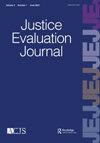Theoretical and Empirical Advances in the Study and Control of White-Collar Offenders
IF 0.7
Q3 CRIMINOLOGY & PENOLOGY
引用次数: 7
Abstract
Abstract Over the past decade the study of white-collar crime has been undergoing a resurgence of interest, productivity, and creativity. New findings have emerged regarding the social, demographic and psychological characteristics of white-collar offenders. These findings have spurred theoretical advances in the application of standard criminological perspectives to white-collar crime, including opportunity, life course, and informal social control theory. Researchers have also made advances in understanding how white-collar offenders are treated by the justice system and how they respond to that treatment, and these advances have implications for the prevention and control of white-collar crime. In this presentation, I review these theoretical and empirical advances and suggest avenues for future research and policy on this important and harmful form of criminal behavior.白领罪犯研究与控制的理论与实证进展
在过去的十年里,白领犯罪的研究经历了兴趣、生产力和创造力的复兴。关于白领罪犯的社会、人口和心理特征有了新的发现。这些发现促进了将标准犯罪学观点应用于白领犯罪的理论进步,包括机会、生命历程和非正式社会控制理论。研究人员在了解司法系统如何对待白领罪犯以及他们对这种对待的反应方面也取得了进展,这些进展对预防和控制白领犯罪具有重要意义。在这次演讲中,我回顾了这些理论和实证进展,并提出了未来研究和政策的途径,这一重要而有害的犯罪行为形式。
本文章由计算机程序翻译,如有差异,请以英文原文为准。
求助全文
约1分钟内获得全文
求助全文

 求助内容:
求助内容: 应助结果提醒方式:
应助结果提醒方式:


